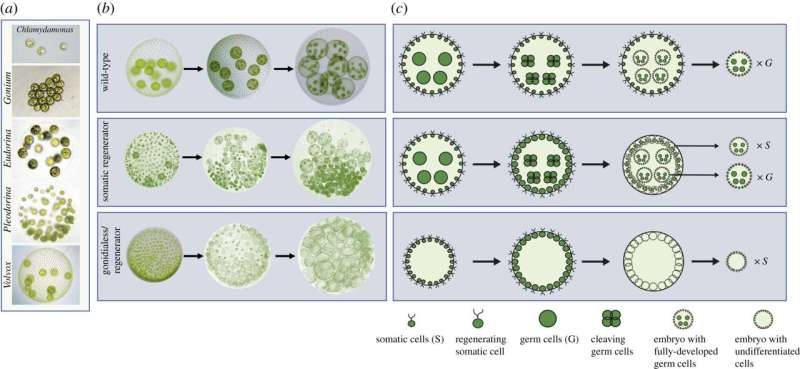June 29, 2022 report
The environmental cost of cheating to overcome cooperation in simple multicellular organisms

A team of researchers at the University of New Brunswick has conducted an experiment to learn more about the evolution of cooperation in groups of living creatures. In their paper published in the journal Biology Letters, the group describe genetically altering a type of green algae to allow it to bypass cooperation.
Scientists have often wondered about the factors that led to the evolution of cooperation between members of biological communities, from simple cells to animals, including humans. And because no one has been able prove exactly how it happens, competing arguments have arisen. In this new effort, the researchers proposed that cheating in cooperative groups must have a penalty of some sort to prevent it from becoming the dominant behavior in a group. To test this idea, they turned to simple green algae, a type of creature with two main types of cells: those that replicate by reproduction and those that do not because they make up non-reproductive body parts. To induce some of the body cells to cheat the system, the researchers edited their DNA in a way that allowed them to reproduce. They then left the algae to their own devices.
The researchers found, as expected, that the number and proportion of body cells began to grow compared to the reproductive cells. The researchers then exposed the algae to harsh environmental conditions such as heat and alternating periods of light and dark. They found that approximately half of the naturally reproductive cells died and that all of those that had been genetically altered had died. The researchers suggest this finding gives credence to their theory—the cheaters in the group paid a penalty for their cheating abilities, becoming more sensitive to changing environmental conditions, and perished because of it, preventing them from passing on their genes.
The researchers suggest similar types of trade-offs are likely in other cooperating groups as well. And such cooperation, they further note, likely played a role in the evolution of multicellularity in early life.
More information: Marybelle E. Cameron-Pack et al, A personal cost of cheating can stabilize reproductive altruism during the early evolution of clonal multicellularity, Biology Letters (2022). DOI: 10.1098/rsbl.2022.0059
Journal information: Biology Letters
© 2022 Science X Network




















